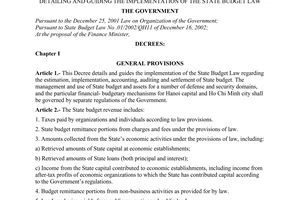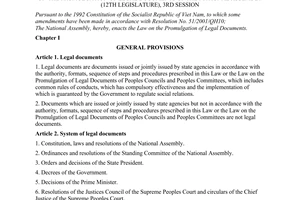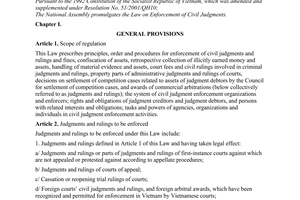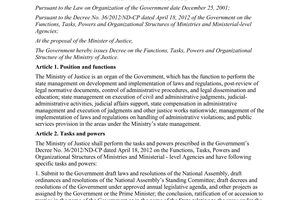Nội dung toàn văn Joint-Circular No. 09/2014/TTLT-BTP-TANDTC-VKSNDTC-BTC guidelines Resolution No. 36/2012/QH13
|
THE MINISTRY OF
JUSTICE - THE SUPREME PEOPLE’S COURT - THE SUPREME PEOPLE’S PROCURACY – THE
MINISTRY OF FINANCE |
SOCIALIST
REPUBLIC OF VIETNAM |
|
Hanoi, February 28, 2014 |
JOINT CIRCULAR
ON GUIDELINES FOR PILOT IMPLEMENTATION OF BAILIFF INSTITUTION PRESCRIBED IN RESOLUTION NO. 36/2012/QH13 DATED NOVEMBER 23, 2012 OF THE NATIONAL ASSEMBLY
Pursuant to Law on enforcement of civil judgments;
Pursuant to Law on issuance of legislative documents;
Pursuant to Law on organization of People’s Court;
Pursuant to Law on organization of the People’s Procuracy;
Pursuant to Resolution No. 36/2012/QH13 dated November 23, 2012 of the National Assembly on continuation in pilot implementation of bailiff institution;
Pursuant to Decree No. 61/2009/NĐ-CP dated July 24, 2009 of the Government on pilot organization and operation of bailiffs in Hochiminh city;
Pursuant to Decree No. 135/2013/NĐ-CP dated October 18, 2013 of the Government on amendments to the name and a number of articles of Decree No. 61/2009/NĐ-CP dated July 24, 2009 of the Government on pilot organization and operation of bailiffs in Hochiminh city;
Pursuant to Decree No. 60/2003/NĐ-CP dated June 6, 2003 of the Government on guidelines for implementation of the Law on State budget;
Pursuant to Decree No. 22/2013/NĐ-CP dated March 13, 2013 of the Government defining the functions, tasks, entitlements and organizational structure of the Ministry of Justice;
Pursuant to the Government's Decree No. 215/2013/NĐ-CP dated December 23, 2013 defining the functions, tasks, entitlements and organizational structure of the Ministry of Finance;
The Minister of Justice, Chief Justice of the Supreme People’s Court, the Chief Procurator of the Supreme People’s Procuracy and the Minister of Finance jointly issue a Joint Circular on guidelines for pilot implementation of bailiff institution as prescribed in Resolution No. 36/2012/QH13 dated November 23, 2012 of the National Assembly.
Chapter I
GENERAL PROVISIONS
Article 1. Scope
This Circular promulgates guidelines for procedures and expenditures on duties of bailiffs; operation of Offices of bailiffs; supervision and inspection of operation of bailiffs of central-affiliated cities and provinces (hereinafter referred to as provinces) where the bailiff institutions are implemented.
Article 2. Regulated entities
This Joint Circular applies to:
1. Bailiffs, Offices of bailiffs;
2. People’s Courts, Civil judgment enforcement agencies where the bailiff institutions are implemented;
3. Agencies, organizations, and individuals related to implementation of bailiff institution.
Chapter II
DUTIES OF BAILIFFS
Section 1. DOCUMENT DELIVERY
Article 3. Types of documents delivered by bailiffs
An Office of bailiffs shall conclude an agreement on document delivery with Superior Courts (excluding Appellate court of the Supreme People’s Court) and/or Superior Civil judgment enforcement agencies of the province where the Office of bailiffs locates, including: Notices, summons, letters of invitation, decisions on opening trial, verdicts, decisions on trial in case of absence of litigants; decisions on judgment enforcement, notices or summons of Civil judgment enforcement agencies.
If necessary, the Courts or Civil judgment enforcement agencies may conclude agreements on delivery of other documents with the Office of bailiffs.
Article 4. Agreements on document delivery
An agreement on document delivery between a Court or a Civil judgment enforcement agency and an Office of bailiffs shall be concluded as follows:
1. The Court or the Civil judgment enforcement agency shall conclude an agreement on rules for document transfer with the Office of bailiffs. According to the agreement, number and types of specific documents transferred to the Office of bailiffs shall be kept in a delivery record which is certified by both contracting parties.
If the documents are delivered beyond the province where the Office of bailiffs locates, the Court or the Civil judgment enforcement agency may conclude another agreement on specific cases with the Office of bailiffs.
2. Each Civil judgment enforcement agency may only conclude agreements with an Office of bailiffs.
According to actual condition of local government, the Chief judge of People’s Court of each province shall decide that each Court of the province may conclude with whether one or multiple Office(s) of bailiffs.
Each Office of bailiffs has right to conclude agreements on document delivery to multiple Civil judgment enforcement agencies or Courts in the province where the Office of bailiffs locates.
The Chief judge of People’s Court and/or the Director of Department of civil judgment enforcement of a province shall cooperate with the Director of Service of Justice in unanimity of administrative divisions where Offices of bailiffs may conclude agreements with Courts or Civil judgment enforcement agencies of that province.
3. An agreement on document delivery shall contain: types of documents delivered; procedures required notifications; term of agreement; procedures for document delivery; rights and obligations of contracting parties; expenditures on document delivery.
4. The Court or the Civil judgment enforcement agency shall transfer all types of documents as agreed and the Office of bailiffs may not refuse any request for document delivery.
5. The Court or Civil judgment enforcement agency must send a copy of agreement on document delivery concluded with the Office of bailiffs to each State Treasury where the units subject to expenditures on document delivery open accounts after concluding the agreement.
Article 5. Document delivery
Documents shall be sent and received between the Court, the Civil judgment enforcement agency and the Office of bailiffs every working day, unless otherwise agreed, provided that the terms of document delivery are ensured as prescribed in law on procedures and civil judgment enforcement and they shall be kept in the delivery record form issued herewith.
Article 6. Procedures for document delivery
1. Procedures for document delivery on civil judgment enforcement shall be carried out as prescribed in law on civil judgment enforcement; procedures for document delivery shall be carried out as prescribed in law on procedures.
2. The document delivery shall use forms of the Court or forms issued herewith.
The document delivery is considered as completion if the bailiff follows all procedures as prescribed, including public posting if it fails to carry out direct document delivery as prescribed in law on procedures and civil judgment enforcement.
Section 2. CERTIFICATION OF DOCUMENTARY EVIDENCE
Article 7. Validity of certified documentary evidence
Certified documentary evidence offered by a bailiff shall be an evidence source in order for the Court to consider for a lawsuit settlement and a basis for legal transactions as prescribed in regulations of law.
When assessing the value of certified documentary evidence, if necessary, the Court or the People’s Procuracy may summon the bailiff in order to clarify the authentication of the certified documentary evidence.
Article 8. Amendments to technical defects of certified documentary evidence
1. If there are any technical defects during the recording, typing or printing process of certified documentary evidence, and the amendments to the certified documentary evidence do not affect to its authentication, the bailiff shall take responsibility for the amendments to that defects. The amendments to technical defects of the certified documentary evidence must be kept in a record, which is made, signed and borne the stamp of the Office of bailiffs.
If the certified documentary evidence is sent to the requester and registered at the Service of Justice, the bailiff shall send notifications to the requester and Services of Justice of amendments to technical defects. Service of Justice shall send notification of acceptance or non-acceptance of amendments to the bailiff and the requester.
2. If the certified documentary evidence has two pages or more, each page must be numbered and borne the stamp.
Section 3. VERIFICATION OF JUDGMENT ENFORCEMENT CONDITIONS AND JUDGMENT ENFORCEMENT TERMINATION
Article 9. Verification of judgment enforcement conditions
1. Judgment creditors, judgment debtors, persons with relevant interests and duties in enforcement under competence in enforcement of Civil judgment enforcement agencies of the province where the Office of bailiffs locates have rights to conclude agreements on verification of judgment enforcement conditions with Offices of bailiffs.
When concluding an agreement on verification of judgment enforcement conditions with an Office of bailiffs, the judgment creditor or the judgment debtors must provide judgments of the Court and relevant documents (if any); the person with relevant interests and duties in enforcement must provide documents proving their rights and obligations directly relating to the enforcement.
2. The agreement on verification of judgment enforcement conditions between the requester and the Office of bailiffs shall be concluded under form of service agreement.
Within 03 working days, from the date on which the agreement is concluded, the Head of Office of bailiffs must issue a decision on verification of judgment enforcement conditions, unless otherwise agreed. The decision on verification of judgment enforcement conditions shall be sent to the People’s Procuracy of the district where the Office of bailiffs locates and the competent Civil judgment enforcement agency shall carry out enforcement as prescribed in Law on civil judgment enforcement.
Article 10. Judgment enforcement termination
1. If a requester requires the Office of bailiffs to terminate the enforcement or a bailiff is carrying out enforcement but the judgment enforcement conditions arise beyond the province where the Office of bailiffs locates, the procedures below shall be followed:
a) Contracting parties shall terminate the agreement;
b) The Head of the Office of bailiffs shall issue a decision or request the competent agency to issue a decision on revocation of decisions, notices or other documents on enforcement which are not implemented;
c) Other issues shall be dealt with as prescribed in regulations of law on civil judgment enforcement.
2. Regulations in Clause 1 of this Article shall not apply to the case in which the termination of enforcement requested to the Office of bailiffs by the requester creates negative effects on lawful rights and interests of a third person.
3. When terminating the agreement and dealing with issues, if there is any dispute, contracting parties shall request the Court for settlement as prescribed.
Section 4. FORMS OF OFFICES OF BAILIFFS
Article 11. Forms of Offices of bailiffs
1. 113 forms of Offices of bailiffs shall be issued together with this Circular, including:
a) Logbooks
b) Forms of agreements;
c) Forms of decisions on civil judgment enforcement;
d) Forms of notices, summons, reports, and application in civil judgment enforcement.
2. The Court or the Civil judgment enforcement agency shall make a record of management of their operation related to bailiffs. The preparation and use of the record shall be allocated from operation funding of the Court or Civil judgment enforcement agency as prescribed.
Chapter III
EXPENDITURES ON DUTIES OF BAILIFFS
Article 12. Entities subject to expenditures on document delivery
Government budget shall pay expenditures on delivery of documents of the Courts or Civil judgment enforcement agencies, unless the law on procedures and law on civil judgment enforcement promulgate that litigants are subject to expenditures on document delivery.
Article 13. Expenditures on document delivery
People’s Courts, Departments of civil judgment enforcement, Service of Justice and Service of Finance of the province where the Office of bailiffs locates shall conclude agreements on expenditures on document delivery applying to each district of the province with Offices of bailiffs according to its local government; concurrently, they shall send State Treasuries where units subject to expenditures on document delivery open their accounts as the basis for determination of expenditures on document delivery as follows:
1. Within the scope of the district where the Office of bailiffs locates: not exceeding VND 65,000 per duty (including VAT).
2. Beyond the scope of the district where the Office of bailiffs locates and within the province: not exceeding VND 130,000 per duty (including VAT).
3. If the documents are delivered beyond of the province where the Office of bailiffs locates, the Court or the Civil judgment enforcement agency may conclude an agreement on expenditures on document delivery with the Office of bailiffs, including:
a) Actual expenditures provided that they do not exceed duty expenses applying to governmental agencies and public service providers as prescribed;
b) Actual daily wage of a person in charge of document delivery, provide that it does not exceed duty expenses applying to governmental agencies and public service providers as prescribed;
4. Expenditures on document delivery prescribed in this Article include public posting in case of failure of direct document delivery as prescribed in law on procedures and civil judgment enforcement.
5. Expenditures on document delivery prescribed in this Article shall only apply to agreements performed from the effective date of this Joint Circular.
Article 14. Payment of expenditures on document delivery
1. Expenditures on document delivery shall be paid every month.
The Office of bailiffs must prepare and send invoices to the Court or the Civil judgment enforcement agency. Within 5 working days, from the date on which the invoice is received, above authorities must complete procedures and payment documents, and then transfer money deposited in the State Treasuries where their accounts are opened to make payment of expenditures on document delivery to the Office of bailiffs.
2. If it fails to collect money from litigants on schedule as prescribed in Clause 1 of this Article, the Civil judgment enforcement agency shall pay an advance to the Office of bailiffs from budget estimates allocated by the competent agency as prescribed in law on government budget. The Civil judgment enforcement agency must expedite recovery of expenditures on document delivery paid by the litigants to repay to government budget.
3. With regard to delivery of documents of the Civil judgment enforcement agency, if the judgment is enforced under an entrustment, the Civil judgment enforcement agency which transferred documents to the bailiff shall be subject to payment of the expenditures on document delivery. If it fails to collect money from the litigants subject to expenditures on document delivery, the Civil judgment enforcement agency as a trustor must request the Civil judgment enforcement agency as a trustee in writing to recover the expenditures on document delivery from the litigants.
4. State Treasuries shall control the payment of expenditures on document delivery as prescribed in Circular No. 161/2012/TT-BTC dated October 2, 2012 of the Ministry of Finance on control and payment of government budget expenditures through State Treasuries.
Article 15. Preparation of budget estimates for document delivery
Every year, according to the workload of the previous year and expenditures prescribed in Article 13 of this Circular and estimated workload in the planed year, the Court and Civil judgment enforcement agency where the pilot bailiff institution is carried out shall prepare budget estimates for document delivery to include in the general budget estimates, and then send them to superior authority as prescribed in law on government budget, including:
1. Budget for document delivery paid by government budget.
2. Advance budget paid by litigants.
Article 16. Expenditures on certified documentary evidence and verification of judgment enforcement conditions
1. Each Office of bailiffs shall regulate and post bracket of expenditures on certification of evidence and verification of judgment enforcement conditions publicly, which clarifies maximum fee, minimum fee and rules for calculation.
According to the posted fee bracket, the requester and the Office of bailiffs shall enter into an agreement on fees paid according to duties or working hours and actual expenditures, including: traveling expenses; service fees for agencies providing information; expenditures on witnesses, participants or other expenditures on, if any.
2. When the Office of bailiffs is carrying out judgment enforcement, if the verification is required, the expenditures on verification shall be agreed by the bailiff and the requester as prescribed in Clause 1 of this Article or included in the expenditures on civil judgment enforcement as prescribed in Article 17 of this Circular.
Article 17. Expenditures on civil judgment enforcement
1. With regard to direct civil judgment enforcement, the Office of bailiffs may collect fees according to fees for civil judgment enforcement as prescribed in law on fees for civil judgment enforcement.
With regard to complicated cases, the Office of bailiffs may agree with the litigant about fees for duty performance.
2. If the expenditures on coercive enforcement are exempt or deducted as prescribed in law on civil judgment enforcement, the judgment debtor shall send an application for exemption or deduction to the Office of bailiffs enclosed with documentary evidence. Within 10 days, from the date on which documentary evidence and application are received, the Head of the Office of bailiffs shall send the application to the Director of Department of civil judgment enforcement where the Office of bailiffs locates for consideration and decision. The Director of Department of civil judgment enforcement shall consider the exemption or deduction and pay the amount of exemption or deduction to the Office of bailiffs within 10 days, from the date on which the application is received, then summarize the total amount and request the Ministry of Justice for additional allocation.
If the application is rejected, the Head of the Office of bailiffs must provide explanation in writing to the litigants.
Chapter IV
OPERATION OF OFFICES OF BAILIFFS
Article 18. Operation of Offices of bailiffs
1. Office of bailiffs is a practice organization of bailiffs which is operated under a type of business entity and provides public services for nonprofit purpose.
2. Any Office of bailiffs which is established by a bailiff shall be operated as a private enterprise.
Any Office of bailiffs which is established by two bailiffs or more shall be operated as a partnership.
3. Financial regime of each Office of bailiffs shall comply with financial regime of types of business entity as prescribed in law on enterprises.
Article 19. Cards and uniforms of bailiffs
1. Samples of cards and uniforms of bailiffs shall comply with regulations of the Minister of Justice.
2. Funding for cards of bailiffs shall be allocated by government budget from the annual funding of the Ministry of Justice.
The Office of bailiffs shall ensure the uniforms for those bailiffs working at the Office from the its funding.
Article 20. Dissolution and shutdown of Offices of bailiffs
The dissolution and shutdown of Offices of bailiffs shall comply with regulations of law on enterprises, Decree No. 61/2009/NĐ-CP dated July 24, 2009 of the Government, Decree No. 135/2013/NĐ-CP dated October 18, 2013 of the Government and depending on cases, and then each Office of bailiffs is required to follow procedures below:
1. With regard to dissolution, the Office of bailiffs must send a plan for dissolution to Service of Justice where the Office of bailiffs locates. If Services of Justice agrees with the dissolution, then the Office of bailiffs shall:
a) Complete registration of certified documentary evidence;
b) Terminate agreements as prescribed;
c) Deal with judgment enforcement as prescribed.
2. If the President of People’s Committee of province decides suspension of operation of the Office of bailiffs, within 30 days, from the date on which the decision is received, the Office of bailiffs shall comply with Clause of this Article.
3. Director of Services of Justice must help People’s Committees of province to observe and expedite the tasks when the Office of bailiffs is dissolved or shut down.
Chapter V
SUPERVISION OR INSPECTION OF OPERATION OF OFFICES OF BAILIFFS
Article 21. Scope and competence in supervision of operation of bailiffs
The People’s Procuracy of district where the Office of bailiffs locates has following competence:
1. Supervising the adherence to law of the bailiffs in the document delivery as prescribed in Law on organization of the People’s Procuracy, law on civil judgment enforcement and law on procedures.
2. Supervising the adherence to law of the bailiffs in judgment enforcement as prescribed in Law on organization of the People’s Procuracy, law on civil judgment enforcement.
Article 22. Rights to appeal and requests of the People’s Procuracy
1. The People’s Procuracy of district where the Office of bailiffs locates has right to file an appeal against a decision or legal acts of the Head of Office of bailiffs or bailiffs within 15 days, from the date on which the decision is received or violations are detected. The Head of the Office of bailiffs must provide a response to the appeal within 20 days, from the date on which the appeal is received.
In case the appeal is rejected, the Head of the Office of bailiffs has right to request the Director of Department of civil judgment enforcement of the province where the Office of bailiffs locates for re-consideration within 5 working days, from the date on which the appeal is received. The request shall be both sent to the People’s Procuracy appealed and the superior People’s Procuracy of the People’s Procuracy appealed. The Director of Department of civil judgment enforcement must provide response within 30 days, from the date on which the request is received; the response of the Director shall take effect when it is issued. The response shall be both sent to the People’s Procuracy * and the People’s Procuracy appealed.
If the response to appeal is unfounded, the Chief Procurator of the Supreme People’s Procuracy shall request the Minister of Justice to consider the response to appeal of the Director of Department of civil judgment enforcement.
2. Rights to appeal and request of the People’s Procuracy in the supervision of operation of bailiffs shall comply with Law on organization of the People’s Procuracy, law on civil judgment enforcement and law on procedures.
Article 23. Inspection of operation of bailiffs
1. Service of Justice shall take charge and cooperate with relevant Services, agencies and organization in assistance given to the People’s Committee of the province where the pilot bailiff institution is carried out to inspect the organization and operation of Offices of bailiffs in the administrative divisions.
Other competent agencies must inspect organization and operation of Offices of bailiffs as prescribed.
2. Inspection of organization and operation of Offices of bailiffs shall comply with regulations on inspection.
Chapter VI
IMPLEMENTATION
Article 24. Implementation
1. Every six month or irregularly, General Department of civil judgment enforcement affiliated to the Ministry of Justice, affiliated units of the People’s Supreme Court, the Supreme People’s Procuracy and the Ministry of Finance shall assess the implementation of this Circular, take measures or request Leaders of inter-department or Central steering committee in charge of pilot institution of bailiffs for consideration.
2. Every three month or irregularly, Service of Justice, People’s Court of province, Department of civil judgment enforcement, the People’s Procuracy of province and Service of Finance of province where the pilot bailiff institution is carried out shall exchange and assess the implementation of this Circular, take measures and request Leaders of inter-department and Local steering committee in charge of pilot institution of bailiffs for consideration.
3. Difficulties that arise during the implementation of this Circular should be reported to the competent agencies for consideration
Article 25. Effect
1. This Joint Circular takes effect from April 20, 2014.
2. This Circular replaces the following Circulars:
a) Joint Circular No. 12/2010/TTLT-BTP-BTC-TANDTC dated June 24, 2010 of the Ministry of Justice, the People’s Supreme Court, the Ministry of Finance on guidelines for Decree No. 61/2009/NĐ-CP dated July 24, 2009 of the Government on organization and operation of bailiffs in pilot implementation in Hochiminh city;
b) Joint Circular No. 13/2010/TTLT-BTP-TANDTC-VKSNDTC dated July 7, 2010 of the Ministry of Justice, the People’s Supreme Court, the Supreme People’s Procuracy on procedures for operation of bailiffs in pilot implementation in Hochiminh city;
c) Circular No. 03/2009/TT-BTC dated September 30, 2009 of the Ministry of Justice on guidelines for Decree No. 61/2009/NĐ-CP dated July 24, 2009 of the Government on organization and operation of bailiffs in pilot implementation in Hochiminh city;
3. This Circular shall apply to duties which the Office of bailiffs has been handled but they have not finished until the effective date of this Circular./.
|
PP. EXECUTIVE
JUDGE |
PP. CHIEF
PROCURATOR |
|
PP. THE
MINISTER OF FINANCE |
PP. THE
MINISTER OF FINANCE |
------------------------------------------------------------------------------------------------------
This translation is made by LawSoft and
for reference purposes only. Its copyright is owned by LawSoft
and protected under Clause 2, Article 14 of the Law on Intellectual Property.Your comments are always welcomed







